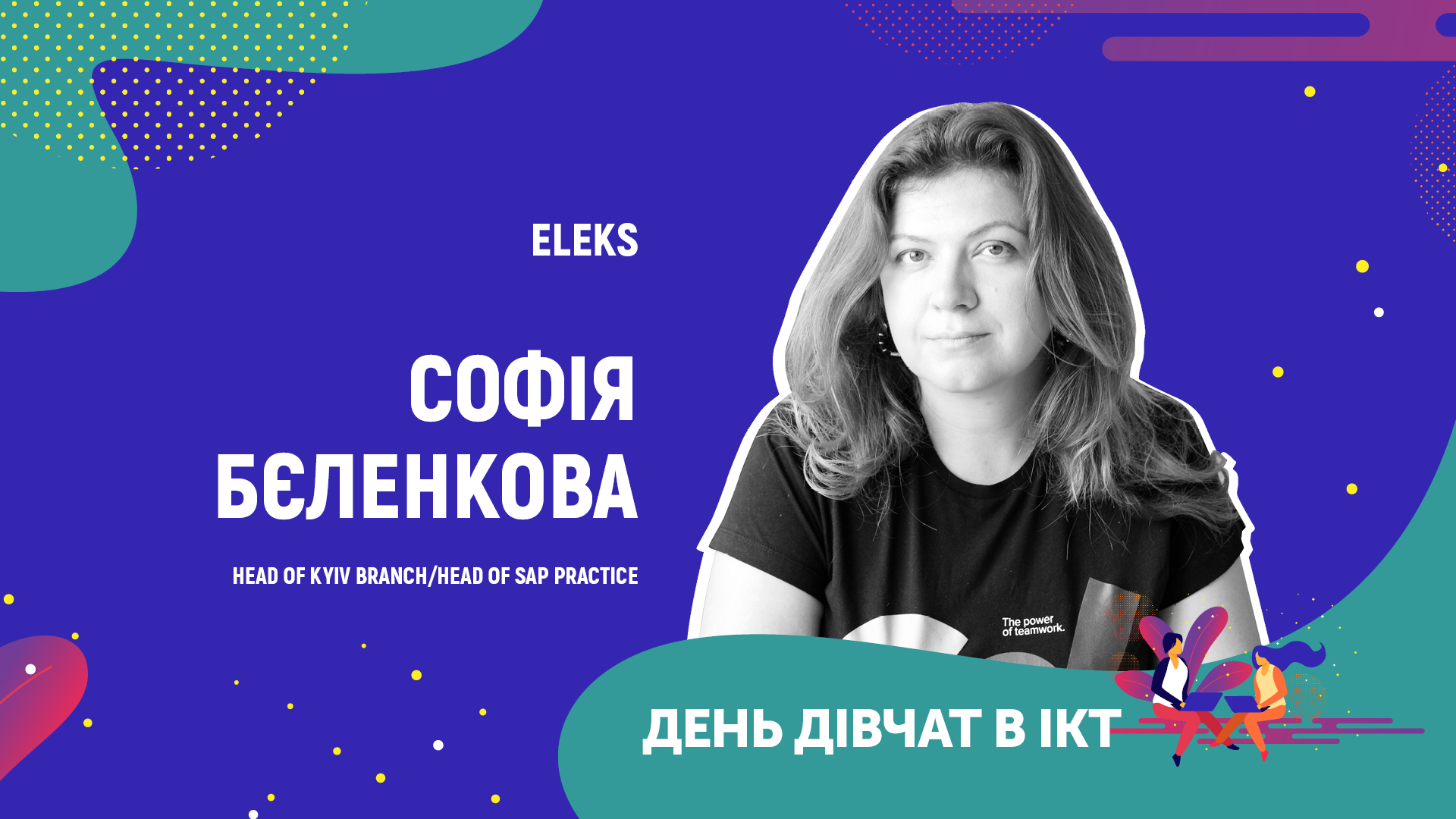We talked to Sofia Belenkova, a Head of Kyiv Branch of ELEKS, on stereotypes that hinder women in IT, femtech, and inspiration at work.
Could you please tell me more about your position in a company and a company itself?
My company is one of the oldest IT companies in Ukraine. It was founded in 1991 and started as a product company, creating automation solutions for energy and medical Ukrainian markets. For the last 20 years, in addition to product development, we have been providing outsourcing services and conduct various types of IT consulting.
Nowadays we have almost 100 clients and over 1500 colleagues, who work from Ukraine, Poland, Estonia, Germany, Great Britain, and the USA.
My main task as of today is to develop the Kyiv branch of the company. Alongside this, I continue to focus on my main job - the development of ERP (enterprise resource planning) area.
What has attracted you to IT? Was it your child's ambition or did you decide in favor of it later?
I liked IT while I was at school, and I decided to study management of information systems, but after only a month of studying, I had to abandon working with computers and transfer to the “management” program.
However, being a third-year student and working in a company with financial analysis, I ended up in the “automation” project. Thus I returned to what had always been interesting for me. Later, I got a second diploma in the Institute for Applied System Analysis of Kyiv Polytechnic Institute.
The most thrilling for me at that time was the opportunity to change the whole industry using IT instruments: to expand capabilities, to accelerate the process and influence a reduction of costs of the goods, to see with the help of numbers what is going on at the manufacturing and which changes affect the result.
How do you think, can distance education and courses substitute university education in a technical field? Or the classic education is a must for a professional?
In my opinion, classic education aims to create a strong foundation of basic knowledge and “to teach how to learn”. And for further self-improvement, there are not only courses and distance education, but also books, podcasts, professional communities, and rotation in working positions (when you are honestly telling your boss that you are ready for development in new areas). Nowadays IT includes plenty of experts that have law, economic, pedagogical and various other degrees.
On the one hand, the technical sphere is still sometimes described as a “male”. On the other hand, IT is gradually becoming a powerful field of economy, and more and more people are willing to enter this field, new companies and startups arise. Do you believe women to be represented enough in IT?
Last year, there was a statement in one of the reports, that the percentage of women in Ukrainian IT is about 40. This number is higher than in the world, yet there is still room for growth. The amount of positions in IT where the employer prefers to hire a woman is increasingly growing. However, in my opinion, recruitment in IT is not gender-biased and bases on your skills and proficiency.
On which level do you think girls are the most hindered by stereotypes concerning IT? Is it on the family level, during education or at work?
According to my experience in working with students, families usually do not understand what IT is, how many roles, opportunities, and areas it has. I often hear: “parents told me to get a normal education first”.
Concerning education, there is another issue. A lot of modern students do not perceive “classic” educational approaches and leave universities or transfer to other fields of knowledge.
However, the key is that the girls themselves do not have prejudice and are not afraid of choosing IT.
Have you ever experienced prejudice in your work?
Yes, at the beginning of my career. I used to work in automation in predominately “male” spheres - energy and oil and gas industries.
I would hear phrases such as “girl, what do you know?” or “maybe, I will introduce you to my son, he needs a wife”. But I have learned to treat such questions as a joke and put the conversation back on track.
According to The Guardian, “femtech” was recognized as one of the words of 2019. Projects, created for women, seem to be beneficial for gender balance since often they are created also by women. Do you know any examples of femtech-startups or female-run technical projects?
There are plenty of them in Ukraine as well, and not only startups but in big IT corporations lead roles are successfully occupied by women. And the majority of IT communities in Ukraine are also initiated and developed by women: TechUkraine, DataScience Community, etc.
Thank you for the examples! What do you think of the #STEMGirls movement?
First of all, it is about support for girls who are interested in self-improvement and empowering each other in STEM spheres. No matter who the girl is - a scientist, or a teacher, or an engineer, or business expert, or is only considering her career.
And the last question. What is the most inspiring part of your job?
The opportunity to constantly learn, interesting colleagues and projects, and also a possibility to see the results of my work and understand my impact.


